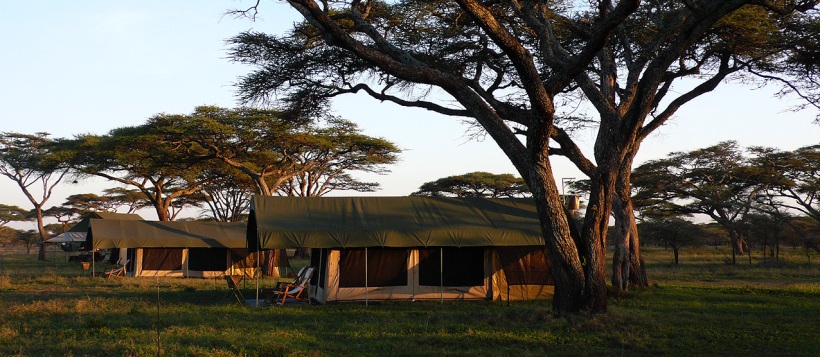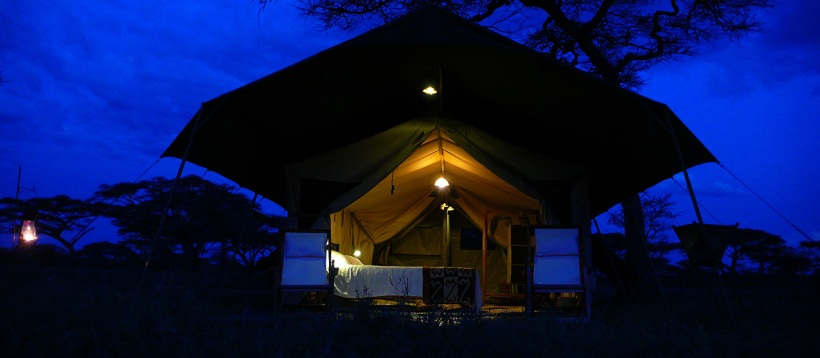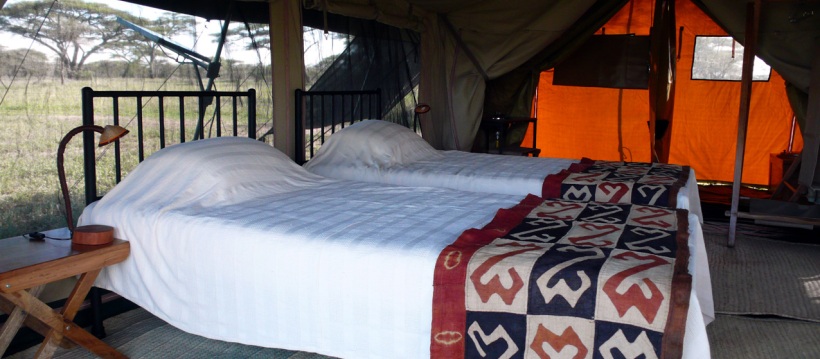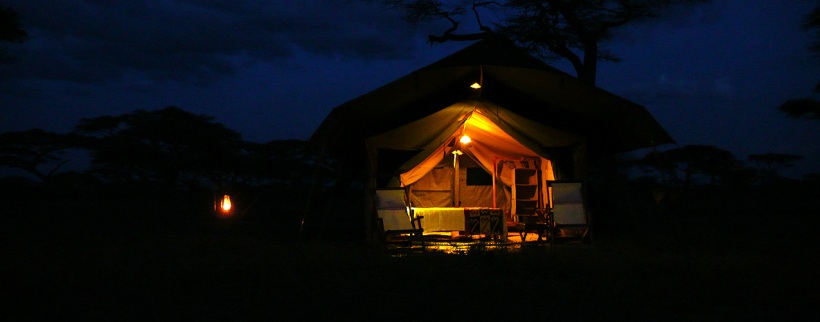www.African Safaris and Travel - Our safaris reflect every travelers style, time frame and budget!
Can start any day, minimum of 2 persons required to operate. Minimum of 3 nights camping
* www.African Safaris and Travel , in association with dmAFRICA, is proud to promote what is probably the only classic mobile tented camp operation to capture the Serengeti Migration
* The main reason for going on safari is for an amazing wildlife experience. We put your clients in the heart of the Migration no matter what time of the year. You sleep with the Migration all around you!
* Experience Safaris as they used to be set up for royalty and the privileged few like Denys Finch-Hatton, Lord Dalamere and Berkely-Cole.
* We do not offer Wi-Fi or flat screen TV or posh toiletries, preferring instead to concentrate on giving you the roar of a lion, the smell of canvas and rustle of the African bush
* Enjoy large (9m x 3.6m x 2.55m), comfortable, beautifully-furnished walk-in tents, with en suite shower, toilet and a veranda.
* A camp set up exclusively for you in an area right where the migration will be on that day.
* Most other operators are offering seasonal camps on a shared basis with 10-20 strangers in the camp which is more like a lodge experience than an exclusive camp.
* From a cost point of view our mobile camp on an exclusive basis is also cheaper and better value for money than the shared experience of the seasonal camps
* Most of the serious professional guides (including Paul Oliver, Mark Thornton, Jo Anderson, Marc Baker and the Peterson brothers) will always choose to work with our camp as their first choice
* The food is prepared by a private chef and you can eat and enjoy game experiences at times suitable to you.
* No waiting in line for breakfast or delaying your game drive while you wait for the stragglers and strangers in the neighboring tent to join you.
* Our arrangements come with all meals and a free bar. You can eat inside the mess tent or outside , with “surprise “ bush breakfasts and lunches set up for you to enjoy during your game drive.
* At night you can dine out under the stars
* Romance and adventure also come free.
Do it for real. If you go on safari and do not sleep in a tent, then you have only been on holiday and not on safari!
General Logistics
Our Classic Mobile Camp is a totally private and exclusive camping experience, accommodating up to 8 people, with large walk-in tents each with dressing area, private en-suite shower and toilet. There is a separate dining/mess tent, and free bar. This camp reflects the style and luxury of the Classic Camping safaris of a bygone era.
The camp operates all year round and is always set up within reach of the Migration, with pre-booked campsites confirmed well in advance. We are able to move the camp to other locations if requested in advance. It can move to the Ngorongoro Highlands, Lake Manyara National Park or Tarangire National Park or in various other wilderness areas of Northern Tanzania.
The Classic Camp is a self sufficient unit transported in a custom-designed 6x6 truck with a trailer and a dedicated pickup truck. These carry all the water and fuel, a camp freezer, tents, bedding, cutlery, washbasins, fresh fruit and vegetables, bar, ice, camp crew and everything else you could possibly imagine that would make your stay comfortable, whilst maintaining the core requirement of being mobile.
We have our own fuel and water, and so do not depend on the proximity of these services when we plan itinerates. All we need to consider is the wildlife density and the overall experience of being in the wild. This enables us to be, and we often are, far from other tour groups, roads, lights, and other signs of civilization. This is a unique element of being on a real safari, and it is amazing to think that in the rushed and interconnected world we live in today, it is still possible to totally get away, sit by the campfire under a starlit sky and not see another light anywhere…. nor hear another sound other than those of the African bush.
How does the Classic Mobile Camp Work?
You might wonder why this camp is so special, or why the
camp should be mobile, and what we mean by “mobile”?
Firstly, the camp is booked solely for you on an exclusive
basis. There are no other guests in camp. There is no need
for you to compromise your needs with other people’s here,
no waiting for service while the steward attends to other
guests, or having to explain which group you belong to so
you may be told where your dining table is located. There
are no set meal times. Quite simply, the camp becomes your
home. You have meals when you want, and how you want. We can
also make use of camp facilities while on our activities.
One day your guide might plan an early start and take a picnic breakfast. You can then stop at your convenience, find a spot and sit in camp chairs and watch, for example, zebras come to a waterhole to drink. Another day, the camp crew might bring out an elaborate brunch that you can enjoy sitting at a dining table set under an acacia tree and served by the camp waiters.
Each day is different and because we do not need to
concern ourselves with other guests and the crew does not
have to cater for anyone else, we are at liberty to relax
and experience the rhythm of Africa in a way hard to do in
larger camps or lodges. As this camp is mobile it can easily
pack up and move with the seasons. We select the best
campsite for your safari, and the camp is erected there
ready for you when you arrive. In the Serengeti, that would
mean you would be near the lush Serengeti Plains in the
green season, as that is where the herds are at that time of
year. In the dry season you could be in the woodland to the
north-east or even in the rolling hills in the north-west,
far from the Plains, but always in the vicinity of the Great
Migration.
Being located in areas where there is no Tourist activity for months at a time, there are often very few tracks or roads, resulting in minimal disturbance to the environment. Since our camp is truly mobile, we leave no structures or waste when we depart; not even the campfire ash. Nobody would know we were ever there.
While the camp is mobile, it has all the comforts that you could imagine, complete with a separate dining tent with its own bar. Your tent comes with fresh towels, solar lighting for all areas of the tent, convenient canvas shelves for your clothes, relaxing chairs on your veranda, a dressing table and mirror and hot showers at any time upon request.
All these comforts mean it takes around twelve hours to break camp and load it into the truck. We plan the camp’s movements before a safari; after three or four days in the mobile camp, we may stay in a permanent tented camp or lodge for a change of atmosphere, and to allow mobile camp to move to a new location.
The Classic Safari Tent
Our custom-built safari tents comprise four sections all under one roof... veranda, bedroom, dressing area and shower and toilet. The inner tent structure is 9 meters long (27 feet) and 3.6metres wide (12 feet).
The Veranda
In the front there is a large, covered veranda which provides shade and a vantage point to enjoy the views and any visiting wildlife. This is furnished with a couple of comfortable recliner chairs and a wooden side table.
The bedroom section
The bedroom section is a 16 square meters (186 square feet) tent, which is more than two and a half meters (8feet) high in the centre and a meter and seventy centimeters (5.5 feet) at the shoulders, giving great comfort and all the room you need to spread out clothes, books and camera equipment. For coolness, it has large netted windows on all sides, with rain flaps that can be zipped up easily. It is totally waterproof and has a sewn-in groundsheet of heavy plastic to keep out insects and other uninvited guests. It has an overhead solar light and each bed has its own bedside light. We can provide tents with twin or triple beds or a single king-size bed
The dressing area
There is a dressing and shaving area, complete with dressing table, large make-up mirror, a hanging hold-all and a washbasin.
Shower and toilet areas
There are two sections at the
rear of the tent comprising the shower and short drop toilet
closets. Hot water for showers is available at all times.
This area is lit by an overhead solar light.
Classic Tent Service
The tent steward will bring you refreshments and care for your laundry and other housekeeping needs.
The Classic "Mess" Ten
The arrangements are provided on a full board basis with free mineral water, soft drinks, beers and wine served at meals
Meals on safari can be delicious, using the wonderful
variety of fresh and organic grown vegetable and fruit;
Bread, cakes cookies and muffins are freshly baked using no
more than a tin box covered with coal as an oven! We pride
ourselves on our healthy and ingenious food, garnished with
home-made sauces, relishes and fresh herbs.
Meals are
silver service in a large dining tent with full size tables
with candles lit at dinner - sometimes we choose to dine out
under the stars with a barbecue over the campfire. Snacks are
served around the evening camp fire
We are well-experienced in meeting the needs of special diets , including vegetarians, Kosher or Halal religious requirements, allergies, or other reasons.
There is a free bar which includes imported gin, vodka, Scotch whisky, Martinis, wines, beers, mineral water, juices and soft drinks. It is a tradition to serve champagne around the camp fire on the final night.
Staffing
We provide a high staff ratio, including full tent service, waiters, chef, camp hands and camp manager. The number of staff provided is according to the party size but is works out around one staff member per guest.
What should I bring on safari?
Nothing, other than your camera, binoculars and personal needs. You need no money, no computer and no i-phone. But do bring your intention to communicate with the amazing and wonderful natural World!
Serengeti and Masai Mara Migration Calendar
One very easy rule of the thumb is that the surest way to maximize viewing the migration is by Camping! Regardless to accommodation qualities camping sites are always exclusive and always chosen by the location of the migration.
We book the proper camp sited well in advance, but we book more then one site so in the end we can choose to locate our camps closest to the migration according to each years individual rain patterns; In some periods of the year the migration can be accessed from various lodges and camps while during other times it can't while camping will offer a good chance of witnessing it due to our flexibility, it’s not a guarantee but it offers better chances.
River crossings:
The most dramatic feature of the migration that people wish to see are the river crossings; these commonly occur in June and early July on the Grumeti river and then August-October on the Mara River; it is very hard to witness this with a regular safari program, you will have plenty of people that want to see it; but it should be clear that in order to have a high chance to see this phenomena then we have to stay with them in remote areas of the Serengeti for a longer period then usual, 3-4 nights in one location at the least, and the accommodation options there are both limited and expensive although getting more options in those areas nowadays
The Calving Season:
During End of January and up to about the end of February; the Female Wildebeest herds drop their calves on the Serengeti plains; this is probably the most dramatic time to visit the short grass plains, but again few locations are good to witness this phenomena, and they fill well in advance; to witness this phenomena we again recommend a minimum of 3 nights in one location.
Below are general guide lines, for each season; but for a serious request that wishes to witness the migration in force we need to see how we build a special program including more then one location! So in an ideal year the following would be the general guidelines if you want to have good wildlife watching in the Serengeti with reasonable chances to see the migration.
December – April
The southern Serengeti, short grass plains (both Serengeti National Park and Ngorongoro Conservation area, and the Piaya area outside the Serengeti); the main draw is the calving season that ideally occurs at the end of January and up to about the 3rd week of February, but game viewing to April is stunning.
Lodges: Ndutu Lodge
Tented camps: Kusini camp, Masek camp.
Camping in the
southern Serengeti areas; here also there is the west-east
axis that means that no lodge can guarantee the migration
and best to split the stay, which we do for migration
programs like in the north.
May:
Herds move north and west, and fill the Moru Kopjes area
and the western wilderness zones.
Lodges: Sopa Serengeti
Lodge
Tented camps: Kusini camp
Camping in the Moru &
Rongai areas
June-July:
Herds move north to the western corridor and then onwards
through Grumeti reserves to the northern Serengeti.
In
this period and usually around end June early July the herds
cross the Grumeti river.
Tented camps: Mbalageti Tented
lodge, Kirawira Tented Camp, Grumeti River Camp, Soroi
Tented camp, Grumeti reserves.
Semi-permanent tented
camps that move into the area for that time: EMC, Serengeti
Under canvas.
Camping in the Grumeti River area
August - October:
Herds move north to Northern Serengeti during this time
the whole north is good, but the herds move fast after rain
between Mara and Serengeti and the north east out side the
parks (Klein's area) but always a large part of the herds is
inside the Serengeti NP. The Zebra herds move south earlier
and reach Seronera by mid - October usually.
In this
period the herds cross the Mara River multiple times from
south to north and from north to south,
Tented camps:
Sayari Camp, Serengeti Bush tops, Olakira camp.
Camping
in the Mara River area.
November – December:
Herds move south on the eastern border of the park to
Piaya and from there cross into the park, usually they
spread through out the whole area.
During this time the
center and the east are good, but the herds move fast after
rains.
Lodges: Klein's camp, Mbuzi Mawe. But all the
central valley lodges are also good during this time Sopa,
Serena etc.
Camping on the eastern side here it is the
most varied, and we need to make very late decisions as to
the locations due to the fluidity of the herds at this time.
![]() From $3,685 per person sharing, depending on
season. Please contact us for a quote based on your
envisaged travel period.
From $3,685 per person sharing, depending on
season. Please contact us for a quote based on your
envisaged travel period.



